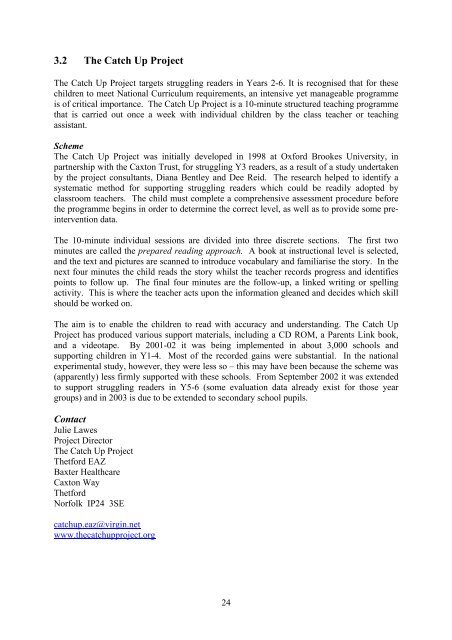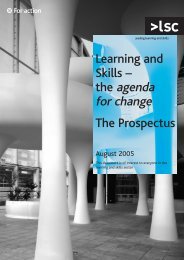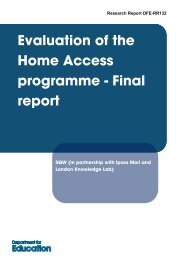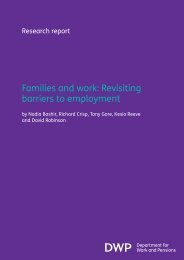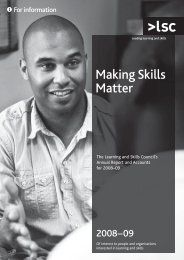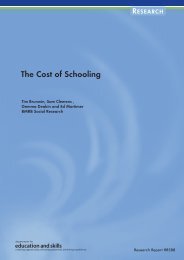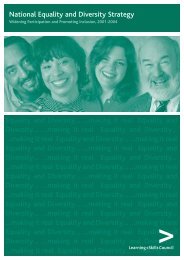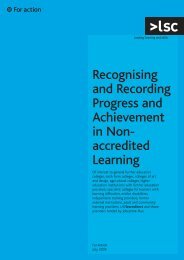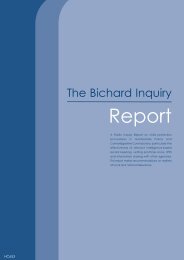What Works for Children with Literacy Difficulties? - Digital ...
What Works for Children with Literacy Difficulties? - Digital ...
What Works for Children with Literacy Difficulties? - Digital ...
You also want an ePaper? Increase the reach of your titles
YUMPU automatically turns print PDFs into web optimized ePapers that Google loves.
3.2 The Catch Up Project<br />
The Catch Up Project targets struggling readers in Years 2-6. It is recognised that <strong>for</strong> these<br />
children to meet National Curriculum requirements, an intensive yet manageable programme<br />
is of critical importance. The Catch Up Project is a 10-minute structured teaching programme<br />
that is carried out once a week <strong>with</strong> individual children by the class teacher or teaching<br />
assistant.<br />
Scheme<br />
The Catch Up Project was initially developed in 1998 at Ox<strong>for</strong>d Brookes University, in<br />
partnership <strong>with</strong> the Caxton Trust, <strong>for</strong> struggling Y3 readers, as a result of a study undertaken<br />
by the project consultants, Diana Bentley and Dee Reid. The research helped to identify a<br />
systematic method <strong>for</strong> supporting struggling readers which could be readily adopted by<br />
classroom teachers. The child must complete a comprehensive assessment procedure be<strong>for</strong>e<br />
the programme begins in order to determine the correct level, as well as to provide some preintervention<br />
data.<br />
The 10-minute individual sessions are divided into three discrete sections. The first two<br />
minutes are called the prepared reading approach. A book at instructional level is selected,<br />
and the text and pictures are scanned to introduce vocabulary and familiarise the story. In the<br />
next four minutes the child reads the story whilst the teacher records progress and identifies<br />
points to follow up. The final four minutes are the follow-up, a linked writing or spelling<br />
activity. This is where the teacher acts upon the in<strong>for</strong>mation gleaned and decides which skill<br />
should be worked on.<br />
The aim is to enable the children to read <strong>with</strong> accuracy and understanding. The Catch Up<br />
Project has produced various support materials, including a CD ROM, a Parents Link book,<br />
and a videotape. By 2001-02 it was being implemented in about 3,000 schools and<br />
supporting children in Y1-4. Most of the recorded gains were substantial. In the national<br />
experimental study, however, they were less so – this may have been because the scheme was<br />
(apparently) less firmly supported <strong>with</strong> these schools. From September 2002 it was extended<br />
to support struggling readers in Y5-6 (some evaluation data already exist <strong>for</strong> those year<br />
groups) and in 2003 is due to be extended to secondary school pupils.<br />
Contact<br />
Julie Lawes<br />
Project Director<br />
The Catch Up Project<br />
Thet<strong>for</strong>d EAZ<br />
Baxter Healthcare<br />
Caxton Way<br />
Thet<strong>for</strong>d<br />
Norfolk IP24 3SE<br />
catchup.eaz@virgin.net<br />
www.thecatchupproject.org<br />
24


